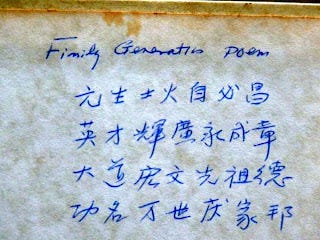By tying ourselves to our ancestors, names have helped our societies understand who we are for millennia. In the pursuit of distinctiveness, the internet has abandoned those ties, and chosen names that help people remember we exist, but not who we are beneath the surface.
A couple of weeks ago, we published a short essay at Culture3 by a writer who goes by the pseudonym (or do we just say ‘name’, at this point), crookedteeth.
Most people don’t expect quality from anonymous people on the internet, so it’s always a delight when you get it. It’s a good essay: analytical, original, meaningful. But most reputable publishers today would never commission an anonymous writer, even if they were the best essayist in the world.
The internet is almost a world they refuse to touch. On the internet, a pseudonym is really all that matters. It’s tied to everything you’ve done online, after all, and that can tell you enough.
The trade is swapping a name that’s meaningful in the physical world for one that’s memorable in the digital. In the physical world, names are designed so a relatively small number of people can resonate with you. In the digital world, it’s so a large group of people engage with you for an instant.
Our naming conventions come from an era of small communities where common names weren’t that common. Remembering the people in your life and the identity behind the name is not difficult.
That changes on the internet, which is built for new discoveries rather than exploring past ones. Digital names, like MKBHD or patio11, look unusual because they optimise for being distinctive. Fighting a rapid onslaught of content, all that matters for someone building a presence online is that you are distinctive.
In a sign that internet-native generations are increasingly embracing this approach, 60% of American millennial parents think it’s important for their child to have a unique name, compared to 40% of the older generations before them.
You lose a lot, however, by sacrificing names with meaning for those that stand out online. Across the world and throughout history, family names have said something about your story. Your family’s history, where you’re from, or the social group or clan of which you’re a part.
Across the Western, African, and Indian worlds, names often include reference to a parent, typically the father. Islamic names often include ‘Muhammad’ (or a similar spelling) in a child’s name, typically as a cultural reflection of the importance of the prophet, even if it’s not their main given name, like author Hanif Mohammed Koeln.
Small tribes tend to have less formal structures, but generally reference aspects of that person’s identity, typically referencing their relation to you: “sister, the one who slipped in the river.”
Chinese culture world has a long tradition of family names, which originally reflected your clan or area, and today sometimes also allude to occupation or rank. In traditional Chinese families, a Generation Poem is often used as a naming practice that connects sometimes a dozen generations. The poem, usually a meaningful message or family motto, is created with a sequence of characters, with each subsequent character serving as a ‘middle name’ for each subsequent generation.
As China has developed, people swapped traditional ties to city life, and relied less and less on their family for economic or social resources. The tradition has been in decline for decades, reflecting the declining importance of family as an institution.

While names designed for the internet are effective at capturing attention, they seldom capture the multi-dimensional aspects of our identities: our history, relationships, how you relate to the broader social context. In forgetting this, we lose the richness that comes from being part of a community, for names that have little lasting significance.
There are families on the internet, but it feels odd to phrase it like that. Rather, the internet has empowered groups of people to unite and form genuine affection. From gaming circles to the LGBT+ community, the internet is a gathering point for those who want to associate with people who share important characteristics.
They aren’t families in the same sense. They don’t persist across generations, and you can opt-in and opt-out. But maybe that’s not a problem. In these sorts of niche communities lie human connections of real meaning, where rich identities are shared, embraced, and developed.
It doesn’t matter today whether your great-so-many-grandparent was a blacksmith or a tailor. And in a world where a family rarely spends more than a few generations in the same place, remembering where you come from matters less. There are new concepts that matter in every person’s life. If our naming conventions can’t keep up, perhaps the internet can.
This doesn’t absolve our online identities from sacrificing depth for discoverability. Depth that mattered centuries ago might not matter now, but depth itself still matters. To forge identities that are as meaningful as they are memorable, the globalism of the internet can help us retain the richness of our own individual stories.






i’m interested in what actual internet family requires